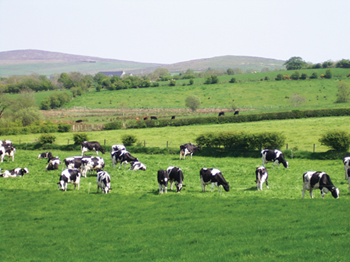The 1990's were a golden time for Ireland. The country's high-technology sector boasted a relatively low corporate tax rate which allowed the economy to grow and unemployment to decrease to record-breaking levels. When this progress began to slow at the turn of the twenty-first century, the state turned to mortgage and construction companies to maintain a steady level of growth. This focus inflated these industries tremendously, without much capital to back this gain, and in 2008 they collapsed, leaving an intense economic recession their wake. In 2010, the European Union and International Monetary Fund bailed out the country, provided that Ireland complied with strict budgetary restrictions (Boland et al., n.d.).
 |
Agriculture is an important industry in Ireland's economy. |
Ireland does, however, lack a large supply of minerals. In fact, the country must depend almost entirely on imports for energy development. Almost all rural homes are "connected to the national electricity network, which relies partly on hydroelectric plants and on small and medium-sized peat-burning thermal power stations" (Boland et al., n.d.).
The country is one of the world's top exporters of computer software. Ireland's chief trading partner is the United Kingdom, among other European Union nations. Other significant exports include textiles, food, and machinery.
 |
Ireland adopted the euro as its official currency in 1979. |
Sources:
Boland, F., Edwards, R.W.D., Kay, S., Ranelagh, J. O., Abhinav, V., Albert, M., ... Young, G. (n.d.). Ireland. Encyclopædia Britannica. Retrieved from http://www.britannica.com/EBchecked/topic/293754/Ireland
Ireland. (2013). Retrieved from http://www.heritage.org/index/country/ireland
[Photograph of euros]. Retrieved from http://blogs.channel4.com/faisal-islam-on-economics/euro-collapse-contingencies-at-davos-is-berlin-listening/16096
[Photograph of dairy cow field]. Retrieved from http://www.eolasmagazine.ie/where-now-for-irish-agriculture
No comments:
Post a Comment